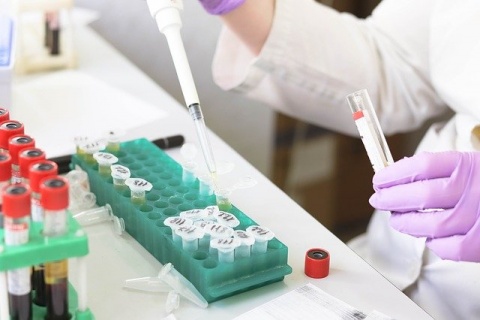Duke Emergency Medicine COVID-19 Research Response

Photo above: Scientist performing tests in the laboratory
In March 2020, it became apparent that the United States was going to be facing a new pandemic illness with no specific, proven treatments. The novelty of the SARS-CoV-2 virus meant that even the most experienced clinicians could not confidently make treatment recommendations because they did not have a specific evidence base to support their clinical practice. Researchers around the globe quickly attempted to organize multi-center clinical trials and Duke Emergency Medicine (EM) was at the forefront of this movement.

Professor of Emergency
Medicine
Internally, Duke University organized a School of Medicine COVID-19 Research Task Force, charged with coordinating efforts across disciplines, from emergency medicine, infectious diseases, hospitalists, intensivists, pediatrics, surgery, as well as existing research administration leaders responsible for overseeing research personnel, laboratories, informatics, and regulatory specialists. Alexander Limkakeng, MD, as Director of the Acute Care Research Team, was included on the Task Force to represent emergency medicine. The first order of business was to identify and train a core of clinical research staff capable of enrolling patients in research trials and specimen repositories. Duke Emergency Medicine was fortunate to have 2 of their staff who were capable of joining this group.
Next, the Task Force needed to identify an orderly process for approaching potential participants. Given the large number of studies that rapidly started up and organized, a central pager system was created to assign particular patients to specific studies, based on inclusion and exclusion criteria as well as the desire to balance enrollment across studies. One of the first of such studies was the NIH PETAL Network’s study of hydroxychloroquine, ORCHID. Duke EM’s efforts in this trial was led by John Eppensteiner, MD. The trial enrolled 479 patients by early June, demonstrating that hydroxychloroquine did not show any beneficial effect in symptomatic patients.

Medical Instructor in
Emergency Medicine
At the same time, Duke EM participated and assisted several registry studies of COVID-19 patients. One study was led by researchers from Indiana University while the PETAL network organized both a retrospective and prospective study. Duke EM also assisted Duke investigators Chris Woods, MD, and Matthew Kelly, MD, with their registries of outpatient adults and children, respectively. These studies will help inform our understanding of physiology of the infection, and identify important blood biomarkers that can be used for diagnosis or prognosis. Additionally, Duke EM is assisting an industry sponsor to develop a newer, less invasive point-of-care diagnostic test for COVID-19 infection.
Although it is difficult to know what the future holds during this pandemic, Duke EM stands poised to contribute new knowledge in our fight against COVID-19. Currently, Duke EM is preparing for two more trials of treatments for COVID-19: convalescent plasma and monoclonal antibodies. The former is being led by the NIH SIREN network and is called “Clinical Trial of COVID-19 Convalescent Plasma of Outpatients (C3PO)," whereas the latter has an industry sponsor. Both studies will attempt to identify treatments that may protect patients earlier in the course of infection from downstream worsening and adverse events.
Give to Duke Emergency Medicine
The Duke Department of Emergency Medicine relies on individual gifts and philanthropic partnerships to help support our clinical, research, and educational missions and to secure funds for the future.
